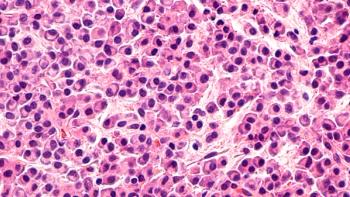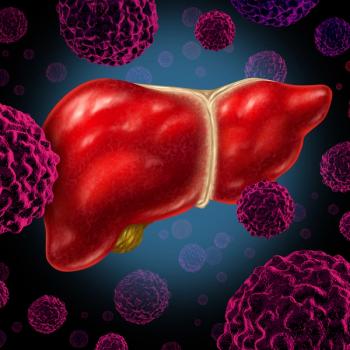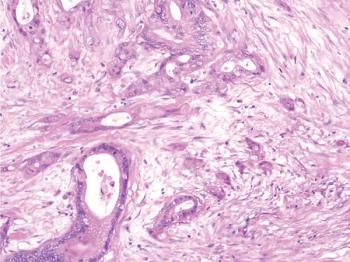
The FDA approved the supplemental new drug application for ponatinib (Iclusig) to treat patients with chronic-phase chronic myeloid leukemia (CML) with resistance or intolerance to at least two prior kinase inhibitors.

Your AI-Trained Oncology Knowledge Connection!


Kristie L. Kahl is vice president of content at MJH Life Sciences, overseeing CURE®, CancerNetwork®, the journal ONCOLOGY, Targeted Oncology, and Urology Times®. She has been with the company since November 2017.
She is a graduate of Rider University, where she acquired a Bachelors of Art in journalism, as well as a graduate of Temple University, where she received her Masters of Science in Sports Management.
Follow Kristie on Twitter at @KristieLKahl, or email her at kkahl@mjhlifesciences.com.

The FDA approved the supplemental new drug application for ponatinib (Iclusig) to treat patients with chronic-phase chronic myeloid leukemia (CML) with resistance or intolerance to at least two prior kinase inhibitors.

The agency authorized use of the first coronavirus disease 2019 vaccine to prevent the disease caused by severe acute respiratory syndrome coronavirus 2 in individuals 16 years of age and older.

Behavioral interventions were found to help young breast cancer survivors in reducing their depressive symptoms.

Women who were younger, diagnosed with breast cancer, and received chemotherapy were reported to have a higher risk of new chronic controlled substance use following mastectomy with reconstruction.

The combination induced low rates of infusion-related reaction, and had a shorter administration duration, increasing convenience for patients and decreasing treatment burden, according to Meletios A. Dimopoulos, MD.

The procedure provided effective, long-term local control for patients with localized penile cancer, highlighting the need for a multidisciplinary approach to patient care.

Deep-learning algorithms could be used to alert pathologists to suspicious areas of cancer burden prior to clinical assessment, according to Nitin K. Yerram, MD.

The novel androgen receptor-signaling inhibitor led to negative repeat biopsies after 90 days of treatment among men with very-low risk to favorable intermediate risk prostate cancer on active surveillance.

A telemedicine Multidisciplinary Urologic Cancer Clinic at the University of Washington/Seattle Cancer Care Alliance conducted video visits, inducing high patient satisfaction, sparing substantial travel burden and providing individuals access to multidisciplinary urologic cancer care.

The company expects to complete the rolling submission of its biologics license application for ublituximab in combination with umbralisib in the first half of 2021.

The agency granted fast track designation to irinotecan liposome injection for patients with small cell lung cancer who progressed following a first-line platinum-based regimen.

The FDA granted accelerated approval to pralsetinib to treat with advanced or metastatic RET-mutant medullary thyroid cancer or RET fusion-positive thyroid cancer.

The agency approved the first PSMA-targeted PET imaging drug to treat men with prostate cancer.

The agent’s new drug application will be reviewed under the FDA’s Real Time Oncology Review pilot program and under Project Orbis.

The combination regimen demonstrated improved progression-free and overall survival in patients with previously untreated advanced RCC, according to results from the phase 3 CheckMate-9ER trial.

The agency approved the first and only immunotherapy treatment as a first-line therapy for adult patients with unresectable malignant pleural mesothelioma.

“The combination of cabozantinib and atezolizumab demonstrated encouraging clinical activity in previously untreated patients with advanced ccRCC,” said investigator Sumanta Kumar Pal, MD.

Treatment with a novel BiTE® immuno-oncology therapy showed a manageable safety profile with preliminary efficacy in patients with metastatic castration-resistant prostate cancer.

The PARP inhibitor reduced the risk for death by 31% in men with metastatic castration-resistant prostate cancer, compared with enzalutamide or abiraterone plus prednisone.

The FDA approved the first anti-BCMA therapy, belantamab mafodotin-blmf, to treat patients with relapsed/refractory multiple myeloma who have received 4 prior therapies.

The FDA has approved tafasitamab-cxix in combination with lenalidomide for the treatment of adult patients with relapsed or refractory diffuse large B-cell lymphoma.

The phase 3 ASCENT trial designed to evaluate sacituzumab govitecan-hziy in patients with brain metastasis-negative, metastatic triple-negative breast cancer met its primary end point of progression-free survival.

The FDA lifted the partial clinical hold on the on the pivotal phase 2 trial of camidanlumab tesirine (Cami) – designed to evaluate the antibody drug conjugate in patients with relapsed or refractory Hodgkin lymphoma.

Adjuvant immunotherapy induced improved survival compared with those who did not in patients with stage 3 melanoma, according to data from a large real-world database.

RO7198457 in combination with atezolizumab induced significant levels of neoantigen-specific immune responses with a manageable safety profile in patients with locally advanced or metastatic solid tumors.

Andrea Dwyer addressed why it is important to raise global awareness around the increasing rate of EAO-CRC, and how healthcare providers can get involved.

An investigational PD-L1 PROBODY therapeutic, CX-072, demonstrated durable responses and appeared tolerable in patients across multiple tumor types.

The phase 3 PROTECTIVE-2 (Study 106) trial met its primary and secondary end points in preventing chemotherapy-induced neutropenia following treatment with plinabulin in combination with pegfilgrastim.

The FDA approved nivolumab for the treatment of patients with unresectable advanced, recurrent or metastatic esophageal squamous cell carcinoma after prior fluoropyrimidine- and platinum-based chemotherapy.

The most common, expected, and reversible treatment-emergent adverse event associated with the agent was cytokine release syndrome.